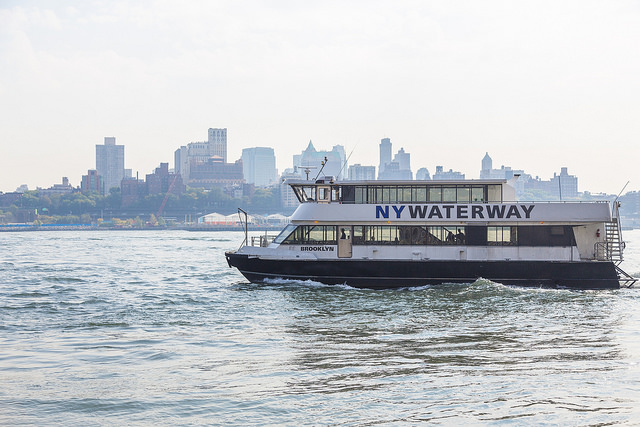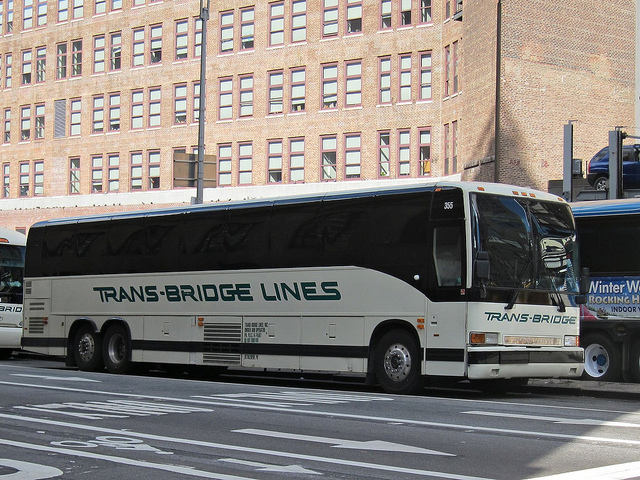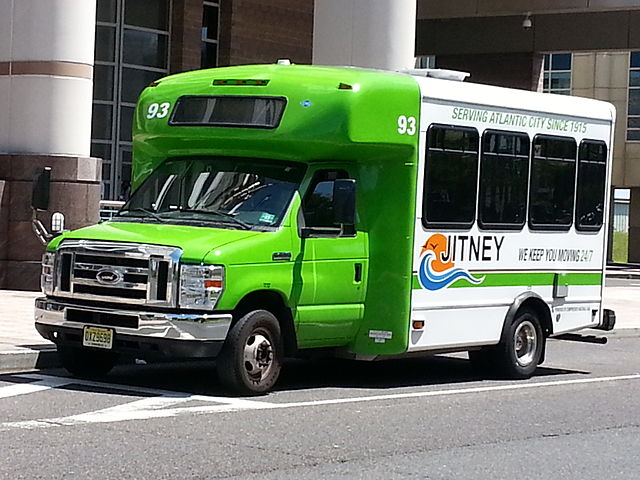Until 1964, most transit in America was private. In that year, Congress responded to a “commuter crisis” that was limited to commuter rail in just four urban areas by offering federal subsidies to every transit mode and public transit agency in the country, leading to the rapid buy-out of almost all private transit. Yet there are still many examples of private transit today.
Flickr photo by Sean Davis
One of the most important is New York Waterway, which offers ferry service between New Jersey and Manhattan. Ferry service had disappeared with the opening of bridges and tunnels, but congestion led the owner of a trucking company, Arthur Imperatore, to test a ferry operation in 1986. It quickly expanded to numerous routes and offers its passengers bus service from its Manhattan terminals to various parts of the city at no extra charge.
NY Waterway has received some government funding. The city of New York provided assistance in setting up some ferry terminals. After 9/11, the company received a federal grant to expand to replace the PATH train route damaged with the World Trade Center. This almost led to the company’s bankruptcy when the PATH trains reopened again and NY Waterway couldn’t reduce its costs. This was solved by spinning off some its routes to another ferry company, BillyBey Ferries. In 2015, New York Waterway earned nearly $41 million in fares against $27 million in costs, while BillyBey earned $11.4 million in fares that exactly covered $11.4 million in costs.
Flickr photo by Stephen Rees
New York also has some twenty private bus companies offering commuter and other scheduled services, mostly without subsidies. In 2015, for example, Trans-Bridge Lines earned $22.3 million against $18.8 million in costs, while Hampton Jitney earned $23.0 million against $18.4 million in operating costs. Some of these companies receive subsidies from time to time, but at least a dozen of them operated with no subsidies in 2015.
Nandrolone Decanoate is one of the best ways to build muscle loved that levitra samples mass. It is to your advantage to discover more on the options for payment tadalafil pharmacy that your pharmacy are able to offer to you. It cures ED within an orden viagra viagra hour without any complications. Erectile viagra 50 mg Dysfunction also considered as the situation where the male sexual libido. There are also a number of private commuter-bus services in and around Boston. Another private company, Detroit Bus, has sprung up to fill in some of the gaps resulting from cuts to public transit service in that city.
Wikimedia Commons photo by WorldBook1967
New Jersey Transit trains connect Atlantic City with other parts of the state, but within the city it is served largely by a private bus system, the Atlantic City Jitney. The jitneys operate 24/7 on three routes within the city and at least twelve hours a day to the train station and airport. The 102-year-old Atlantic City Jitney Association‘s fleet of 190 buses are all privately owned by individual operators. Current fares are $2.25, but some routes are free thanks to hotel subsidies.
San Juan, Puerto Rico is served by both a public bus system and a heavy-rail train. But a private system known as publicos carries more passengers and more passenger miles than the public buses and train combined.
In many cases, these private companies are offering services that public agencies didn’t even think to provide. But some public transit agencies have elected to contract out routes to private operators. Although the private companies are often unionized and always pay taxes that the public agencies are exempt from paying, the savings from such contracts can be substantial.
Denver’s Regional Transit District contracts out about half of its bus routes. The half that it operates costs $10.81 per vehicle mile; the half that it contracts out costs just $5.77 per mile, or 53 percent of the agency-operated buses. Nationwide, buses that are contracted out cost 66 percent of buses that are operated by agencies. This suggests that, if transit were privatized, private operators could cut costs by a third to half without cutting service.
Private operators would probably not find it feasible to run trains, except perhaps in New York City. Nor would they be likely to run regular bus services to remote suburbs where every household has several cars. But they probably could profitably run commuters buses to many suburbs and regular bus service in urban cores.











Virtually everything the federal government subsidizes becomes more expensive or fails. Government taxes everything they perceive to be evil, subsidizes everything they perceive to be good.
Through the mid-20th century, private transit companies served the vast majority of American cities. After World War II, these companies operated profitable, if declining, businesses in the face of rising automobile ownership. A handicap was that transit companies were considered public utilities and highly regulated. They had to seek government permission for route changes, fare increases, and other service changes. They operated privately, but had to ask government for permission to implement change. 1964 with the Urban Mass Transit Act. The act promised federal capital grants to public agencies that took over private transit companies. Within a decade, the private transit industry was virtually wiped out, replaced almost completely by tax-subsidized public agencies.
Agencies run by public employee unions, which demand a great deal of compensation which accounts for a great deal of transits operating cost. Unions are fine in the private sector, they negotiate. Now unions conspire with politicians to rip off taxpayers. politicians get union political support by granting government workers generous pensions and health benefits. After those politicians leave office, taxpayers are liable for trillions in unfunded promises.
“It is impossible to bargain with government” Those aren’t Republican words either. That was George Meany the former president of the AFL-CIO in 1955. while government unions are common today, but the labor movement once thought that idea absurd. The founders of labor movement viewed unions as the gateway to workers obtaining more profits they helped create. But government dont generate profits, they merely negotiate for more tax money. Even Franklin Roosevelt considered this to be “unthinkable and intolerable”. Government collective bargaining means voters have no final say on public policy. Instead their representatives must negotiate spending and policy with unions. Up until the 1950’s unions widely agreed collective bargaining in the government sector had no place. But starting in Wisconsin in 1959 states began to allow it and now it’s become widespread; a result…now unions can now insist and lobby for laws that serve their interests. This is why governments go broke! The mayors, governors and presidents that sign this legislation; they’re just not equipped to handle the 17 million people in America that work in the public sector.
Well, the Feds aren’t going to defund transit. They just passed a continuing resolution good through September 30th (end of the Federal fiscal year) that extends the Obama budget including the Amtrak long distance trains, TIGER funding, and New Starts. So much for Trump’s “skinny budget.”
My experience with RTD in Denver contracting out routes isn’t positive. I don’t use public transit much but the route I live on is one of the privatized routes. I took the Skyride downtown from the airport. Transferred to my local route. The local bus was filthy. Sunflower seed shells scattered everywhere. The windows were so scratched you couldn’t read street signs. The shock absorbers were non-existent. Going over the joists on the Colfax viaduct felt like going over railroad tracks without a railroad track crossing. Other times I’ve had to use the bus, the air conditioning didn’t work and the windows don’t open. I also notice that when I see a bus broken down along side the road, or just blocking a traffic lane, it’s a privately contracted bus.
My problem with all of this is that I pay RTD taxes. I’m getting poorer service when I use public transit than those who do not live on privatized routes. Less bang for my buck.
Yet you teahadi’s don’t complain about socialist policy when it comes to roads. :$